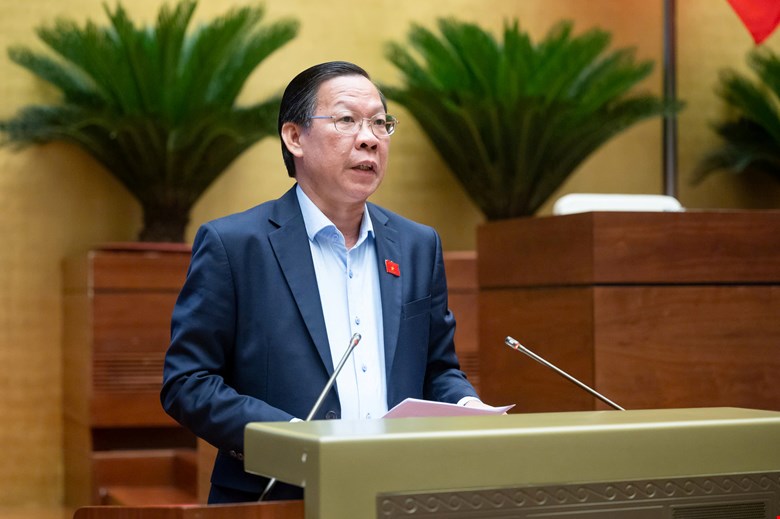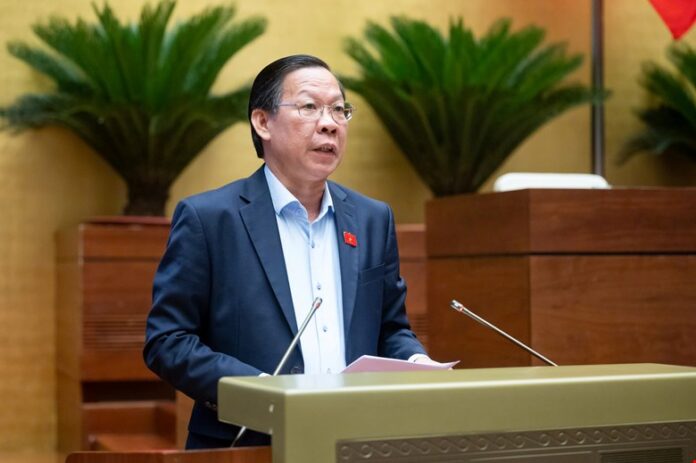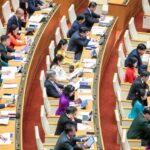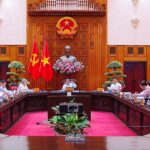On the morning of May 13, the National Assembly listened to a report on the explanation, reception, and editing of the draft Law on State Capital Management and Investment in Enterprises.
Reducing procedures by 50% for the Prime Minister
Presenting the report, Chairman of the Committee for Economic and Financial Affairs Phan Van Mai said that regarding decentralization, delegation, and simplification of administrative procedures, the Standing Committee of the National Assembly has directed the review and editing to clarify the tasks and powers of the Government, the Members’ Council, the Chairman of the company at enterprises with 100% state-owned capital, the state capital representative, and the representative of the enterprise’s capital.
Cutting down 7/24 (about 30%) of administrative procedures; about 50% of the procedures submitted to the Prime Minister were reduced or decentralized to the state capital representative agency, with more decentralization to enterprises.
Regarding the principles of state capital management in enterprises, many opinions suggested clarifying the regulation that “state capital after investment in enterprises is determined to be the property and capital of the enterprise’s legal entity.”

Chairman of the Committee for Economic and Financial Affairs Phan Van Mai
The Standing Committee believed that stipulating the above content in the draft Law could create inconsistencies and difficulties.
For example, the Enterprise Law does not specifically regulate that the contributed capital invested in an enterprise is the property and capital of the enterprise’s legal entity. “Adding this principle may conflict with the concept of state capital in enterprises in the draft Law,” said Mr. Mai.
At the same time, the subjects of the draft Law are enterprises in which the State holds more than 50% of the charter capital and less than 50% of the charter capital. Therefore, besides state capital invested in enterprises, there is also capital from other contributing members/shareholders.
The provisions in the draft Law have ensured the principle that enterprises are proactive and autonomous in using capital and assets for production and business activities according to the decentralization of the state capital owner representative. Therefore, the National Assembly Standing Committee requested that the National Assembly not stipulate this content in the draft Law.
Enhancing Enterprise Autonomy in Salary Decision-Making
Regarding enterprise investment activities, some opinions suggested that the regulation prohibiting enterprises from engaging in real estate business was inappropriate.
The Standing Committee of the National Assembly also accepted this opinion and adjusted the draft Law accordingly, not limiting investment. Specifically, the draft Law stipulates that the investment activities of enterprises are carried out in the forms of investment prescribed by the Law on Investment and other relevant laws; investing in the purchase of fixed assets; and purchasing securities according to the Law on Securities.
Regarding capital mobilization and lending, the National Assembly Standing Committee accepted and edited the draft Law. This regulation has institutionalized the Party’s directive, increasing the autonomy and self-responsibility of enterprises, helping enterprises established or invested in by enterprises to access reasonable capital sources, and creating resources for enterprise development; shifting from pre-inspection to post-inspection.

The draft Law stipulates that the Members’ Council and the Chairman of the Company decide on the wage policy of the enterprise, including the direct owner representative and the inspector
Regarding wage, remuneration, and bonus policies, some opinions suggested enhancing enterprise autonomy in wage decision-making within the enterprise.
Receiving the opinions of the National Assembly deputies, the draft Law stipulates that the Members’ Council and the Chairman of the Company decide on the wage policy of the enterprise, including the direct owner representative and the inspector.
Regarding the distribution of post-tax profits, the draft Law has been edited so that post-tax profits are distributed after paying dividends to contributing members according to the business cooperation contract (if any). Making up for losses from previous years that have passed the time limit shall be deducted from pre-tax profits according to the Law on Enterprise Income Tax. Handling expenses according to the law of the industry; handling expenses for failed innovative investment projects at projects with specific characteristics and high risks but not prescribed by the specialized law, expenses for innovation, failed innovation projects, and expenses for performing political tasks assigned by competent authorities according to the Government’s regulations. The remaining amount shall be used to establish funds and pay to the State budget.
“Dr. Nguyen Van Dinh: Resolution 68 Becomes a ‘Revolution’ for the Real Estate Market”
“The renowned academic, Dr. Nguyen Van Dinh, highlights the groundbreaking nature of Resolution 68, describing it as a ‘true revolution in mechanism’. This resolution marks a pivotal moment as, for the first time, a high-level document emphatically acknowledges the pivotal role of private enterprises.
“Legislators Propose Expanding Eligibility for Civil Servants to Participate in Business Management”
The parliamentary delegates proposed that the draft Enterprise Law should expand the scope of eligible civil servants permitted to manage enterprises. Instead of limiting this privilege to public universities, as is currently the case, this expansion would serve to actualize Resolution 57 and foster widespread innovation and creativity.
The New Congress: A Proposal to Shorten Term Lengths and Fast-Track Elections
As the 9th session of the 15th National Assembly enters its second week, lawmakers are focused on discussing and deliberating on the proposed amendments to the Law on Election of Deputies to the National Assembly and People’s Councils. This important piece of legislation is a key focus for the assembly, as it aims to ensure fair and equitable elections that truly represent the will of the people. The discussions are centered around ensuring that the election process is accessible, inclusive, and reflective of the diverse nature of our great nation.
The Government Tackles Key Issues Ahead of the National Assembly Session
On April 27, Prime Minister Pham Minh Chinh chaired a meeting of the Government’s Standing Committee to provide feedback on four crucial agendas for the upcoming 9th session of the 15th National Assembly, slated to commence in early May 2025.











![[Photo Essay]: Experts, Managers, and Businesses Unite to Forge a Path Towards Sustainable Green Industry](https://xe.today/wp-content/uploads/2025/07/z678592918-150x150.jpg)


![[Photo Essay]: Experts, Managers, and Businesses Unite to Forge a Path Towards Sustainable Green Industry](https://xe.today/wp-content/uploads/2025/07/z678592918-100x70.jpg)






